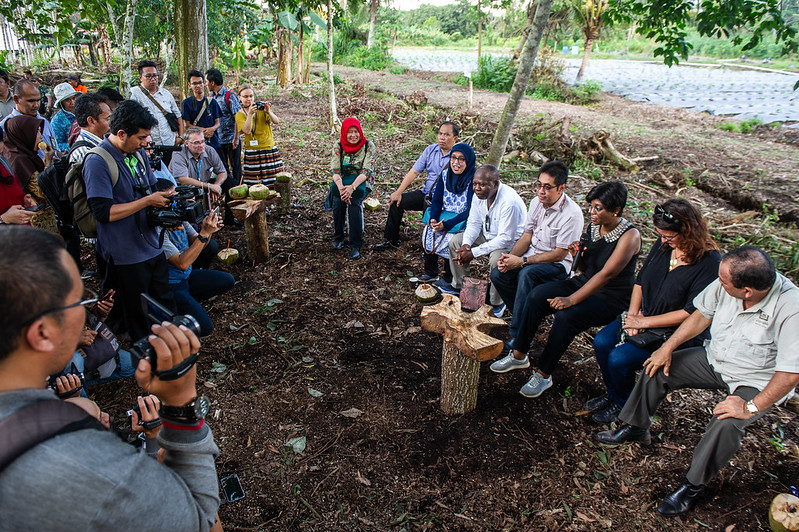
Peatlands store twice as much carbon as all the world’s forests. A significant proportion of this carbon (10-30%) sits in tropical peatlands, which are mostly located in Central Africa, South-East Asia, and South America. But the critical contributions of peatlands to climate change mitigation has only recently been widely recognized, and significant knowledge gaps remain regarding their management, preservation, and restoration.
In that context, the International Tropical Peatlands Center (ITPC) – a multi-stakeholder and multi-donor South-South cooperation involving Indonesia, the Democratic Republic of the Congo, Republic of Congo and Peru, with coordinating partners the Center for International Forestry Research (CIFOR), the Global Peatlands Initiative and the Food and Agriculture Organization of the United Nations (FAO) – soft-launched the Peatland Knowledge Platform in July 2021.
The platform serves as a go-to place for people to find and use publicly-available knowledge and expertise. It facilitates the submission of – and access to – documents, lessons learned, discussions, and more, in order to disseminate and transfer experiences and knowledge. The information found there comprises projects, publications, datasets, and other related communication products resulting from peatland research.
On May 5, 2022, during the 15th World Forestry Congress in Seoul, Republic of Korea, the ITPC hosted a session exploring the platform’s milestones, experiences, and lessons learned so far, as well as ways that its performance might be enhanced into the future.
Moderator Adam Gerrand, Chief Technical Advisor for several FAO projects in Jakarta, opened the session by sharing his hopes for network-building and international collaboration. “We know that there is a lot of knowledge about peatlands around the world, and we want to share that with others,” he said. “This is one of the first opportunities for us to reach out to a lot of people and build the networks, appreciation, and understanding, so that more people are able to engage with [the portal].”
Agus Justianto, the Director General of Sustainable Forest Management at Indonesia’s Ministry of Environment and Forestry, then shared opening remarks. He summarized the ITPC’s formation and journey so far, and added that “we welcome other countries with peatlands to join the ITPC: with this, we will be able to gather and exchange our knowledge and experience directly on the ground. ITPC also welcomes the contribution of multi-stakeholders, including international organizations, universities, research centers and private sectors to support the South-South cooperation, collaboration, and knowledge platform.”
Haruni Krisnawati, the ITPC’s Lead Coordinator, then presented more detail on the knowledge platform’s nature and functioning, including the expert directory and community of practice forum. She also shared interactive functions and features that are still in development, such as output discovery, expert finding, and network analysis. “Ultimately, experts and knowledge providers will be able to interact directly with knowledge users,” she said, “and knowledge users who would like to have more interaction with the experts directly can also use this platform to do so.”
CIFOR scientist Sufiet Erlita next described how lessons learned in peatland projects are not always captured, analyzed, or shared beyond the implementing team, leading to ‘silo-ed’ practice. Then, she introduced the ITPC’s proposal to create a systematic process for capturing and sharing information, which entails collecting the knowledge gained from peatland projects and putting it into a lessons-learned database. “We’re going to have robust knowledge in one single unified platform,” she said, “which we hope is going to break the silos in the knowledge sharing process.”
Muhammad Askary, who is Head of the Sub-directorate for the Sources of Control of Peatland and Ecosystem Degradation at Indonesia’s Ministry of Environment and Forestry, shared information on the government’s own peatland knowledge platform, which is ready to be integrated with the ITPC’s. “Indonesia is keen to share its experience in peatland protection and management to other countries, as an important action for mitigating global climate change,” he said.
Choi Hyung Soon, the Director of the Global Forestry Research Division at the Republic of Korea’s National Institute of Forest Science (NIFoS), shared information about the findings of cooperative research between NIFoS and CIFOR on local communities’ potential roles in peatland protection and management in Indonesia. Their study found that the following elements are particularly important to local communities: respecting traditionally accumulated knowledge and perceptions; strengthening capabilities for financial support, processing and technology; access to markets; and choosing peatland restoration models that maximizes local income through establishment of a cooperative system among regions, local governments, universities, and donors.
Iwan Setiawan, the Deputy Director for Corporate Strategy and Relations at Indonesia’s Sinar Mas Forestry Group, then discussed some lessons learned on approaches to producing peatland knowledge, including technological implementation and community enforcement of sustainable peatland management. “We need benefits for every stakeholder in these landscapes – for companies and for villagers,” he said. “We need to manage peatlands using a landscape approach, which requires cooperation from multiple sectors; and we need improvements in capacity building for the villagers.”
Lastly, the presenters fielded questions from the floor – and from the chat box, for those attending virtually – on a range of topics, including maintenance of canal blocking infrastructure; how food security issues impact peatlands; ways to improve community and stakeholders’ mindsets and capabilities regarding more sustainable peatland use; restoration species selection; how to capture local communities’ knowledge on the platform; and more. Gerrand closed the session with a warm invitation to future collaborators: “I really look forward to all of those who are interested in this collaborative platform getting actively engaged: to sign up, to contribute your information where possible, and also to learn from what is already on the platform.”









